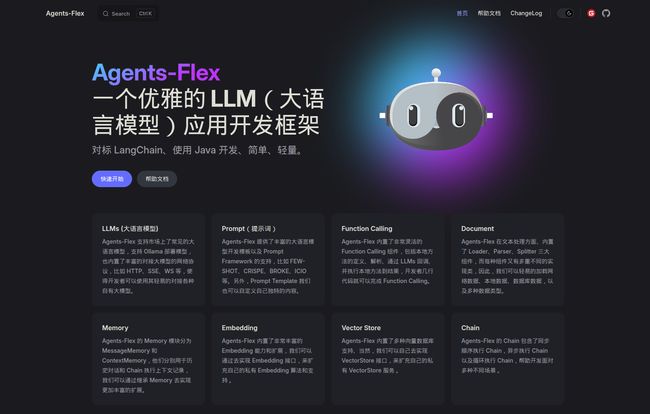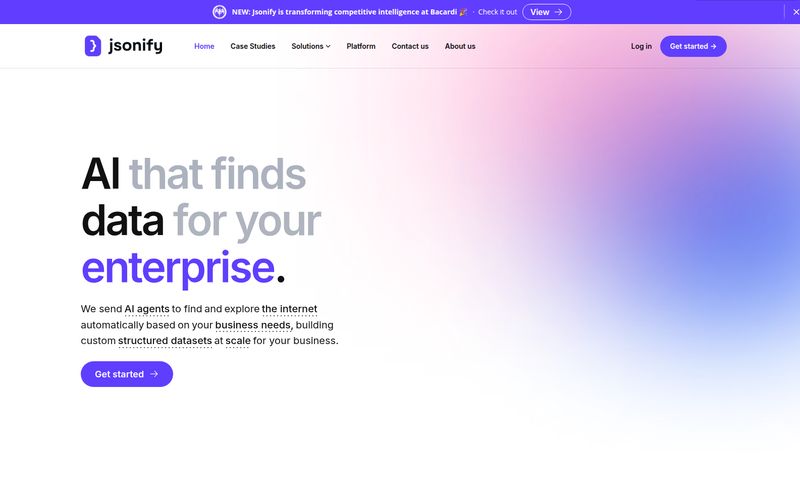For the last couple of years, if you're a developer interested in building with Large Language Models, it’s felt like you had one choice: Python. The entire AI space, from tutorials to the hottest new frameworks, seems to orbit around the Python ecosystem. LangChain, LlamaIndex… they're all fantastic, but they've left a huge chunk of the development world—the enterprise-grade, rock-solid world of Java—feeling a bit left out.
I can't tell you how many times I've been in conversations with dev teams who run on the JVM, and the topic of integrating AI comes up. The first question is always the same: "So, we have to stand up a whole separate Python service just for this?" It's a massive headache. A different language, a different deployment pipeline, a whole new set of skills to manage.
Well, I think I’ve stumbled upon something that might just be the answer. It’s called Agents-Flex, and it’s making a pretty bold claim: to be a simple, lightweight LLM application framework, built for Java developers. My curiosity was definitely piqued.
So What Exactly is Agents-Flex?
Think of Agents-Flex as a set of high-quality LEGO bricks for building LLM-powered applications, but specifically designed for Java architects. The creators are straight-up benchmarking it against LangChain, which tells you everything you need to know about its ambitions. It’s not trying to be a toy; it’s aiming to provide the core components you need to create sophisticated AI agents and workflows directly within your existing Java environment.
It's open-source, released under the Apache 2.0 license, which is a huge green flag for me. It means a community can build around it, and you can use it without worrying about crazy licensing fees down the line. It's built to be simple and lightweight, which is music to the ears of anyone who’s ever wrestled with overly complex, bloated frameworks.

Visit Agents-Flex
Why This is a Big Deal for Java Developers
Okay, so it's a Java thing. But why should you actually care? In my view, it boils down to a few critical points.
You Can Finally Use the Skills You Already Have
This is the big one. The single greatest barrier for a seasoned Java developer to start building with LLMs has been the language itself. Agents-Flex obliterates that barrier. You don't need to go learn Python from scratch. You can stick with the syntax, the build tools (hello Maven and Gradle), and the IDEs you know and love. This drastically lowers the time it takes to go from idea to a working prototype. It's a huge productivity win.
A Full Suite of AI Tools in Your Java Toolbox
This isn’t just a simple API wrapper. Looking through the documentation and features, it’s clear they've thought about the entire lifecycle of an LLM application. You're getting all the good stuff right out of the box. We’re talking about robust LLM support for all the major players and even local models via Ollama, which is fantastic for testing. It includes built-in components for Prompt Engineering with templates like FEW-SHOT and CRISPE, which are essential for getting reliable outputs from models. The framework also provides first-class support for Function Calling, allowing the LLM to use your existing Java methods as 'tools'. This is how you connect the AI's brain to your application's muscles. Add to that a full set of utilities for Document Processing (loading, parsing, and splitting data), intelligent Memory Management to give your agents context and history, and seamless integration for Embeddings and Vector Stores for building powerful RAG (Retrieval-Augmented Generation) systems. And to tie it all together, it has a flexible Chain execution system for both synchronous and asynchronous workflows. It’s a surprisingly complete package.
It Fits Your Enterprise Ecosystem
Java still runs a massive portion of the corporate world for a reason: it's stable, scalable, and secure. Agents-Flex is designed to slot right into that world. You can integrate LLM capabilities into your existing Spring Boot microservices or monolithic Java applications without the architectural gymnastics of maintaining a separate language stack. This is a game-changer for big companies looking to innovate without rebuilding everything.
The Good, The Bad, and The Java
No tool is perfect, especially a newer one. It’s important to go in with eyes wide open. Here’s my take on the pros and the potential bumps in the road.
The Upsides (What I Really Like)
The main advantage is obvious: it's Java-native. This can’t be overstated. It opens up the world of modern AI development to a massive community. I also love the focus on being lightweight. The last thing you want is a heavy framework slowing down your microservice. And the feature set is impressively comprehensive for a project of its age, covering everything from function calling to vector stores.
Potential Hurdles to Keep in Mind
Let's be realistic. This isn't LangChain, which has a gigantic community, endless tutorials, and years of development behind it. The community around Agents-Flex is smaller. That means finding answers on Stack Overflow might be harder, and the pool of third-party integrations might be shallower. The documentation, while functional, may not be as exhaustive as its more mature counterparts. You might have to do a bit more digging in the source code (which, hey, it's open source!). And of course, if you're not a Java developer, this tool isn't for you. But that's kind of the whole point, isnt it?
What's the Price Tag?
This is my favorite part. When I went looking for a pricing page, I was met with an XML error saying the page key didn't exist. That's the best kind of error to find! It confirms what the homepage says: Agents-Flex is free and open-source under the Apache 2.0 License. No tiers, no enterprise plans, no hidden costs. You can clone the repo, add it to your project, and start building immediately. You just can't beat that.
So, Who Should Be Using Agents-Flex?
I see a few key groups getting really excited about this:
- Enterprise Java Teams: Any company with a significant investment in Java that wants to explore or integrate generative AI. This is your most direct path.
- Individual Java Developers: If you're a Java dev who's been feeling a bit of AI FOMO, this is your chance to jump in and start building cool stuff on your home turf.
- Android Developers: While not its primary focus, the Java/Kotlin foundation means there's potential for bringing these powerful back-end agents to mobile development.
Frequently Asked Questions about Agents-Flex
Is Agents-Flex just a copy of LangChain?
Not a copy, but an alternative inspired by it. It provides similar core functionalities but is built from the ground up for the Java Virtual Machine (JVM). The goal is to solve the same problems for a different tech stack.
How difficult is it to get started?
If you are proficient in Java and familiar with tools like Maven or Gradle, the learning curve should be quite manageable. The concepts (chains, agents, memory) are common in the LLM space, so the main task is learning the specific Agents-Flex implementation.
What Large Language Models can I use with it?
It's designed to be flexible. It supports many mainstream models through their APIs (like OpenAI's models) and also supports running local models through services like Ollama. This gives you a lot of freedom to choose the right model for your budget and privacy needs.
Is Agents-Flex ready for production applications?
It seems designed for it, but as with any newer open-source project, you should proceed with caution. The core functionality is there, but the smaller community means you'll be more reliant on your own team's expertise for troubleshooting. For internal tools or new projects, it seems like a fantastic choice. For a mission-critical, public-facing system, you'd want to do extensive testing.
Is it really free to use?
Yes. It is distributed under the Apache 2.0 License, which is a permissive free software license. You can use it in commercial projects without any licensing fees for the framework itself. Of course, you still have to pay for any commercial LLM APIs you use.
Where can I go for help or support?
Right now, your best bet is the project's official GitHub repository. You can check the issues section for common problems, ask questions, and interact directly with the developers. This is typical for a growing open-source community.
Final Thoughts
I'm genuinely excited about Agents-Flex. For too long, the AI development conversation has been a Python monologue. Tools like this turn it into a proper dialogue. It acknowledges that incredible, powerful, and business-critical software is built in other languages, and it gives those developers a first-class ticket to the AI revolution.
It might not have the fame of LangChain yet, but it has the one thing that matters most for its target audience: it speaks their language. And in the world of software development, that's a powerful advantage.



